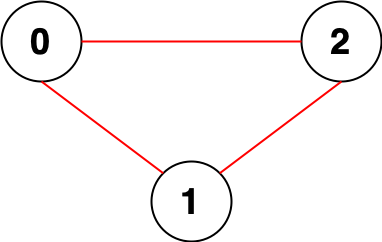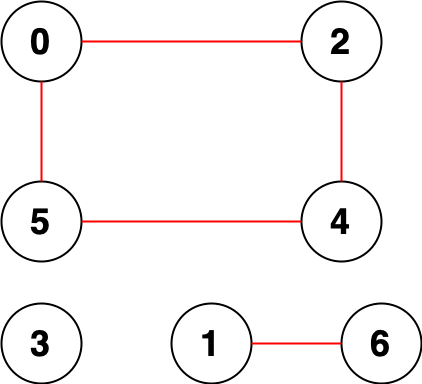Count Unreachable Pairs of Nodes in an Undirected Graph
You are given an integer n. There is an undirected graph with n nodes, numbered from 0 to n - 1. You are given a 2D integer array edges where edges[i] = [ai, bi] denotes that there exists an undirected edge connecting nodes ai and bi.
Return the number of pairs of different nodes that are unreachable from each other.
Example 1:

Input: n = 3, edges = [[0,1],[0,2],[1,2]] Output: 0 Explanation: There are no pairs of nodes that are unreachable from each other. Therefore, we return 0.
Example 2:

Input: n = 7, edges = [[0,2],[0,5],[2,4],[1,6],[5,4]] Output: 14 Explanation: There are 14 pairs of nodes that are unreachable from each other: [[0,1],[0,3],[0,6],[1,2],[1,3],[1,4],[1,5],[2,3],[2,6],[3,4],[3,5],[3,6],[4,6],[5,6]]. Therefore, we return 14.
Constraints:
1 <= n <= 1050 <= edges.length <= 2 * 105edges[i].length == 20 <= ai, bi < nai != bi- There are no repeated edges.
from collections import defaultdict
class Solution:
def DFS(self, graph, i, visited):
for j in graph[i]:
if j not in visited:
self.ctr += 1
visited.add(j)
self.DFS(graph, j, visited)
def countPairs(self, n: int, edges: List[List[int]]) -> int:
graph = defaultdict(list)
for a, b in edges:
graph[a].append(b)
graph[b].append(a)
visited = set()
total = 0
res = 0
for i in range(n):
if i not in visited:
visited.add(i)
self.ctr = 1
self.DFS(graph, i, visited)
res += self.ctr * total
total += self.ctr
return res
Comments
Post a Comment